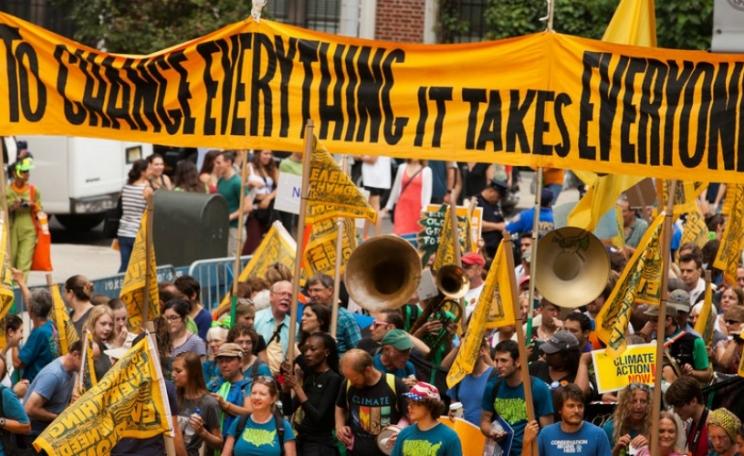As the UK’s political paralysis continues, we’re losing precious time to start moving ourselves towards a greener future – radically retooling our economy to reflect the severity of the challenges ahead.
As the Brexit deadlock continues to dominate the agenda – it’s difficult to keep other pressing issues such as the climate crisis on the agenda.
Extinction Rebellion’s naked protest in Parliament’s public gallery this week, demonstrates the need for bold action to keep the most important issue of our time visible while the public conversation is elsewhere.
We know how urgent serious action on climate change now is. Last year, the UN’s Intergovernmental Panel on Climate Change (IPCC) laid out in clear terms that we have 12 years – now closer to 11 to cut emissions by 45 percent if we’re to keep to 1.5 degrees of warming and reduce the risk of extreme heat, drought, floods and resulting poverty.
Averting catastrophe
Academic Jason Hickel recently wrote in the Guardian that the course of action required to avert catastrophe “represents a total and rapid reversal of our present direction as a civilisation.” As the UK’s political paralysis continues, we’re losing precious time to start moving ourselves towards a greener future – radically retooling our economy to reflect the severity of the challenges ahead.
For campaigners, activists and NGOs the length and breadth of the UK, it’s a daunting and unprecedented to time to be trying to influence to influence public policy. Just how do you keep talking about your issues, keeping up a conversation and attempting to reach policy makers when the normal business of national politics has ground to a halt?
The sight of a group of nearly naked protesters gluing their bums to the security glass in the public gallery of the House of Commons provided a distraction and some light relief from the turgid and seemingly endless debates taking place in the chamber. It may have been a somewhat amusing stunt – which lead to Ed Milliband’s eyes virtually popping out of his head – but the message couldn’t have been more serious.
For years as a country we have failed to take the bold and forward thinking action that is required to seriously reduce our emissions. The IPCC’s report brought home the urgency of the situation but as political stagnation grips the country, we’re virtually unable to discuss the most pressing issue facing humanity.
Extinction Rebellion was formed to take eye catching and provocative direct action to cause disruption that the political classes can’t ignore. To date, it has done that admirably – with this week’s protest building on mass actions that have grabbed headlines and disrupted city centres around the UK.
As the UK’s political paralysis continues, we’re losing precious time to start moving ourselves towards a greener future – radically retooling our economy to reflect the severity of the challenges ahead.
Growing movement
When the political class is failing to address such an important issue – it’s down to ordinary people and communities to use whatever peaceful means are available to them to keep raising the issue and demanding change.
As Extinction Rebellion continues to grow in both numbers and the boldness and audacity of its stunts and actions – I can only hope that the message continues to cut through the noise and that more people are inspired to take action.
Despite how gloomy the political landscape of the UK feels right now – there is hope in the form of our movements. The School Strike for Climate, alongside Extinction Rebellion, demonstrates the power of people whatever their age or background taking action on the most urgent issue of the day.
In many ways it’s disheartening that it’s even necessary for people block access to fracking sites or strip off in the commons – but thankfully people are willing to take direct action for the sake of our future.
As we continue to be gripped by Brexit uncertainty – campaigners and activists will need to find eye catching and effective ways to ensure the most pressing issues facing humanity remain part of the conversation.
This Author
Andrew Taylor-Dawson has been involved with the social justice and environmental movements for over a decade. He works in the NGO sector as well as writing about civil society, campaigning and progressive causes. Twitter: @Andrew_J_Taylor.






